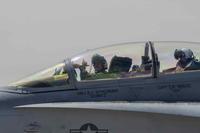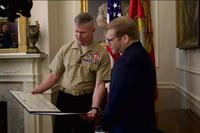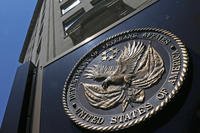Friendly fire was responsible for 35 deaths in the Persian Gulf War -- 23 percent of U.S. military fatalities, a total that led the Pentagon to develop a range of "combat identification" technologies over the next decade.
The percentage of U.S. deaths attributed to friendly fire during Operation Iraqi Freedom was, of course, much lower, but there's still some work to do. Which is why the United States and eight other countries this week are wrapping up a key exercise designed in part to test the military utility of various combat ID technologies.
"Urgent Quest," as it is known, is one of more than 120 major training exercises and experiments sponsored by the U.S. military each year. But such events take troops, time and money, three things in short supply for U.S. troops these days.
No surprise, then, that the Pentagon is thinking about scaling back. As InsideDefense.com's Jason Sherman reported in September, Defense Secretary Donald Rumsfeld has asked for a look into how many of those 122 exercises are necessary.
On top of that, a special panel of Quadrennial Defense Review planners is examining the same question. And Jason has obtained internal QDR briefing charts that show reducing the number of exercises each year is in fact on the table.
All of them combined cost "only" a few hundred million dollars, though -- not enough savings to affect a looming defense budget crunch.
The real reason for wanting to cut back: With so many military personnel either deployed, preparing to deploy or recovering from a stint in Iraq or Afghanistsan, finding troops to participate in live exercises and training events can be tough.
Please take a hard look at your areas of responsibility in each exercise with an eye toward reducing unneeded stress on the force, Rumsfeld said in a July memo to the chairman of the Joint Chiefs.
THERE'S MORE: For a good rundown of this year's major and minor military exercises, some of which the Pentagon would rather you not know about, check out William Arkin's indispensable national security calendar. And don't forget his blog.
-- Posted by Dan Dupont
Less Exercise?
© Copyright 2024 Military.com. All rights reserved. This article may not be republished, rebroadcast, rewritten or otherwise distributed without written permission. To reprint or license this article or any content from Military.com, please submit your request here.








